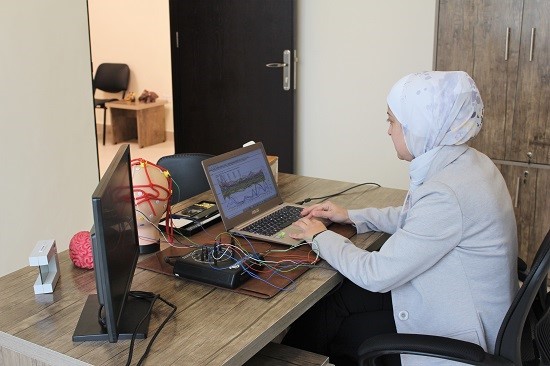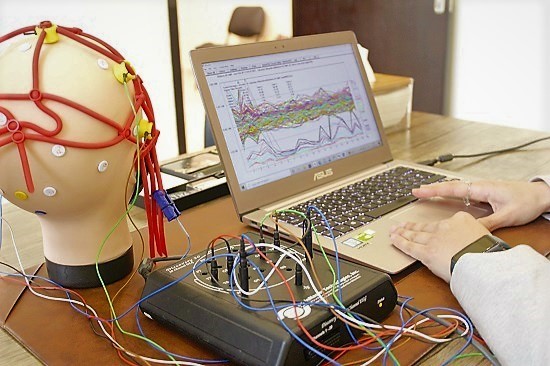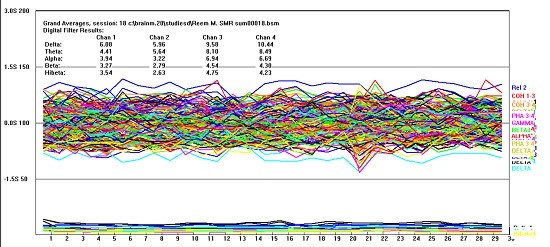AMMAN — In
today’s world, ailments like anxiety, depression and
ADHD (attention deficit hyperactivity disorder) have become so common that it almost seems abnormal to
not have one of them.
اضافة اعلان
According to the
recent
Middle East Medical global study, the Middle East region suffers from
the highest rates of such mental and learning disorders, including suicide.
A new study
published in the Lancet medical journal during the
pandemic reveals that
globally, cases of depression rose by 37 percent above pre-pandemic levels,
anxiety by 26 percent and ADHD by 26 percent among children and alarmingly by
123 percent among adults!
 (Photo: Handout from Wad Abu Zurayk)
(Photo: Handout from Wad Abu Zurayk)
And despite the
available antidepressants, anxiety medications and ADHD treatments, people do
not seem to be recovering any faster. The
lockdowns, fear and lack of
socialization have affected our brains negatively.
So where does
neurofeedback fit in?
Discovered in the
late 1950s, neurofeedback therapy is a non-invasive approach,
prescription-free, to train the brain to stay focused and calm, letting us take
control of our mental health. It is like taking our brain to the gym.
... Globally, cases of depression rose by 37 percent above pre-pandemic levels, anxiety by 26 percent and ADHD by 26 percent among children and alarmingly by 123 percent among adults!
“During the
session, the patient wears the neurofeedback headset which connects the EEG
electrodes to specific areas of the scalp where brainwave signals are picked up
and analyzed through a
software. As the patient watches a programmed video or
plays a game on the screen, positive visual and audio feedback is used to
encourage the brain to recreate optimal mental states. For example, when the
brain waves reach a relaxed state and is within the desired range, the images
may instantly light up, screen characters may go faster toward a winning target
or a rewarding sound will play. When the brain waves are outside the range, the
video pace may slow down,” said Wad Abu Zurayk, a neurotherapist and paediatric
occupational therapist.
 (Photo: Handout from Wad Abu Zurayk)
(Photo: Handout from Wad Abu Zurayk)
Abu Zurayk is the
first qualified neurotherapist in Jordan to have attained her licensed device
from
Germany. The device is both FDA and internationally approved.
“Neurofeedback is
strongly acknowledged as positively impacting people with attention deficit,
hyperactivity disorder, anxiety, post-traumatic stress disorder, depression,
autism and sleep deprivation,” she said.
The therapy targets
symptoms, regardless of the diagnosis, so “if we know which area of the brain
is responsible for the symptom, we ca use neurofeedback to regulate the
brainwaves in that specific area and consequently impact these symptoms to put
you back in the driver’s seat of your own mind, so you can stay focused and
calm even when stressors or distractions pop up,” Abu Zurayk further explained.
Having been through
sessions herself, Abu Zurayk described her experience as one that helped her
regulate her emotions, becoming much calmer and better able to re-regulate
after disturbing events, regaining peace of mind rather fast, in comparison to
her pre-neurotherapy self.
Treatment can start
at a very young age, usually around kindergarten and while results could be
felt after the first session, others may only feel some difference after 15 to
20.
 (Photo: Handout from Wad Abu Zurayk)
(Photo: Handout from Wad Abu Zurayk)
Symptoms are
tracked by the end of each session through analysis of the graphs that indicate
the brainwaves activity. For some, whilst the impact may appear subtle at the
start, the progress gives a precise indication of the brainwaves’ development
and training.
“My patients always
seek a fast fix, however that may not always be possible. While no one brain is
similar to another, the real long-lasting changes need time. This therapy may
make the symptoms disappear or lessen in intensity,” said Abu Zurayk.
Can neurofeedback
therapy replace medication?
According to Abu
Zurayk, it could “lower or stop medications”, depending on the case and
doctor’s recommendation. Those who continue taking the same dose of medication
feel better and respond more effectively to both the therapy sessions and to
the medication taken.
“Neurofeedback will
play an immense role in the future as it is further integrated in the mental
health treatment options. This is just the beginning,” said Abu Zurayk.
Although neurotherapy is still an emerging field, its
potential applications could someday change how we, as a society, relate to the
brain and its malfunctions.
Read more Health




